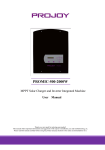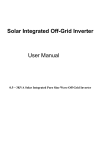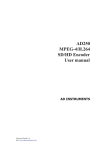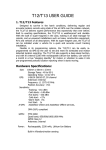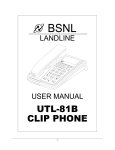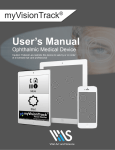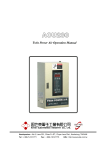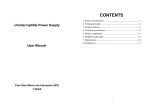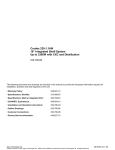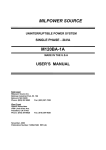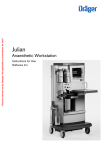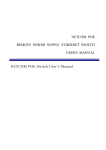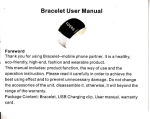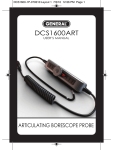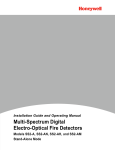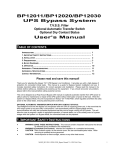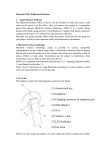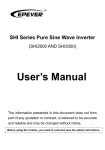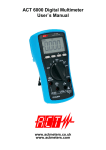Download User Manual
Transcript
User Manual Smart Grid Series Power Conditioning Unit Designed by BORG Inc, USA 2. Safety and Summary 2.1 Safety notice: (Please Follow the instructions below to ensure the security) Keep above 50cm away from the display while installing the product. It is normal that the case surface temperature go up to 50°C during usage. Do not use PCU with overload. Do not open PCU cover in case danger of electric shock, maintenance and battery replacement should be handled by technicians. PCU inner short circuit will cause electric shock or fire danger. Do not put any liquid vessel on PCU. Cut off power rapidly if equipment work abnormal, and contact with local dealers or BORG CARE. Make sure not to keep or use the product in following environment No good air circulation. Place having flammable gas corrosive material or lots of dust. Place under abnormal high or low temperature (above 40°C or below 0°C), and high humidity (above 90%). Place having direct sunlight or close to heater equipment. Place having severe vibration. Outdoor. Use powder extinguisher if there is fire around PCU. Not to use liquid extinguisher in case danger of electric shock. Place sockets nearby PCU, so as to pull out sockets and cut off the power in an emergency situation. The product can provide 100% power output within range of rated voltage ±25%; if out of the range, the output power meets as followings: Warning! Equipment must be connected to the ground 1. The equipment must be connected to the ground. Make sure connect PCU to the ground well while connecting AC to supply power. -2- 2. The power sockets must be 15A/250V or above this specification if the capacity of PCU is above 2KVA. 3. Incorrect operation may cause heavy loss. Please make sure to use the PCU correctly according to this manual. 3. Working principle 3.1 System circuit diagram 3.2 AC Priority mode: 1) When AC power supply is normal: AC input will provide power to equipments through regulator after removing the high frequency harmonic with filter. At this time, PV gives power to batteries only through MPPT control system; 2) When Mains overrun or cut off: The system will convert the energy of battery and PV systems to the power needed by equipments promptly, and give power supply to the user equipment to ensure power supply continuity. -3- 3) When Mains overrun or cut off and without PV (no sun power): The system will convert the energy of battery to the power needed by equipments promptly, and give power supply to the user equipment to ensure power supply continuity. 3.3 PV priority mode: 1) During the day, with ample sunlight, and Mains is normal: solar panel will adjust to the largest state through solar power controller and give power to load through the PCU (Mains as a standby), and charge the battery at the same time (see below diagram); -4- 2) During the evening (or rainy days, with no sun), and Mains is normal: the system will provide power through battery first, discharge until to the set value (reserved a certain power in case of emergency situation), and then automatically switch to the Mains and provide power to loads through the regulator (see below diagram); 3) The evening (or rainy days, with no sun), electricity under abnormal AC input: the system will use battery power to provide power to loads through PCU system. 4) The evening (or rainy days, with no sun), battery has been discharged to empty and Mains recover:System will switch to Mains and give power supply to loads through system regulator. At the same time, charger will start working and charge the battery (see below diagram); -5- 3.4 Bypass Power: four conditions under bypass OVER LOAD; PCU FAILURE; ON: press the ON button by 3seconds. PCU starts within 15seconds; OFF: press the OFF button by 3seconds.,PCU shuts down. 4. Products features 4.1 Multi-setting Can adjust the use mode according to the configuration status and sun source status: PV priority or AC priority mode. Can select the charging current based on the configured capacity of the battery. 4.2 High reliability Independent MPPT (Maximum Power Point Tracking) control microprocessor system. Independent PCU microprocessor control system. Many kinds of protection for overcharge, over-discharge, short-circuit, overload etc and special PV reverse connection protection as well. 4.3 Isolated and pure sine wave technology Adopts advanced SPWM adjustment technology, high speed power MOS, using isolated transformer boosting technology, to get pure sine wave voltage with stable voltage and frequency through LC filter to the load use. 4.4 Advanced MPPT control system MPPT technology is a control method of Maximum Power Point Tracking, which is able to intelligently adjust the solar battery working point, making it always work on the maximum power point of I-V feature curve, to make sure the solar battery always stays at maximum -6- power value output status under different environment. Compared with general solar charge controller, this unit can increase the power conversation efficiency of the solar panel (generated power) up to 20-30%. 4.5 Intelligent Charge management When there is over-discharge, the system will make an equalized charging compensation maintenance to the battery. When it is normally used, the system adopts combined charging manner of constant charging (constant current/constant voltage) and float charging to extend the battery service life. 4.6 LCD+LED display mode Visible straight LED flow and states display. LCD directly display the product operating parameter and states. 4.7 Wide input range MPPT control system adopts PWM adjustment technology which can bear the highest open circuit voltage of the PV battery. The product AC input equipped with high effective online synchronous voltage regulation technology, input from 165-275Vac operating with safety, greatly decrease the battery use frequency and extend the battery service life. 4.8 High-Speed synchronous conversion The system equipped with auto-follow mains phase function make sure the PCU output voltage has same phase of the mains voltage, it greatly decrease the transfer time and the surge voltage occurred during transfer. 4.9 Friendly alarm system 1) PV Priority: When the solar battery is low, Alarming is called once per 5 sec, auto-mute after 40 sec, no longer interfere with the work environment When the battery is running out, the PCU will start rapid alarming again, the frequency is once per 0.2 sec one time, to remind staff, run out of battery, the PCU will shut down. When the battery is running out, the PCU will be off automatically to protect battery. 2) AC Priority: When the solar battery provides power at the beginning, Alarming is called once per 5 sec, auto-mute after 40 sec, no longer interfere with the work environment When the battery is running out, the PCU will start rapid alarming again, the frequency is once per 0.2 sec one time, to remind staff, run out of battery, the PCU will shut down. When the battery is running out, the PCU will be off automatically to protect battery. -7- 4.10 Unattended and intelligent monitoring This products has Automatic shutdown function to meet the monitoring sites, and no off-size regions, this product can also be through the RS232 serial port or USB port and PC communications, real-time monitoring, testing, and time on/off, but also through SNMP network to achieve remote monitoring, testing, and time on/off operation. 4.11 Online protection function Normal PCU Overload: Alarming exceeds 110% load, load will reduce under the rated range within 60 seconds, the system normally provide power supply; timeout,the system will automatically shut down. When AC restore (or manual start), the system will recovery power supply. Abnormal PCU Overload: Alarming exceeds 125% load, it automatically shut down within 5 seconds. When AC restores, the system will recover power supply. Overload in Mains Power: The PCU will give alarm when over 110% load, it switches to bypass within 60 seconds. When reducing load, it automatically restore normal. Short circuit protection: If the PCU output instantaneous state of shock, short circuit, output current limiting device, if more than 10ms, the systems will automatically shut down 4.12 No-Load off function (option) The battery (or under the solar supply power state), the system will automatically detect the load, if the load is less than 5%, the PCU will determine the “no-load” to reduce the loss in no-load state for 1 minute, the system will automatically turn off. 4.13 Self-adaptive frequency When the PCU connected to utility power, the frequency is 50Hz or 60Hz, the system will automatically detect the mains frequency, when Ac power failed, output frequency will be the same with the mains frequency (50Hz or 60Hz). 4.14 Intelligent Communication Port (Option) The PCU can be equipped with RS232, USB or SNMP monitoring interface, with communication with the PC, monitor, support WINDOWS98/NT/2000 / ME/2003/XP/Vistar operating system, automatic storage file. Automatic shutdown, Turn on control. Automatic detection of mains interruption and battery low; all operational data (LCD PCU). Mains interruption, system has automatic saving function countdown, shutdown system and turn off the PCU. Setting of power supply time, records of PCU running state, mains etc. Display systems shut down count down , auto detection, time on/off. -8- 5. Specifications Model Basic Prime Silver Gold Power 500W 800W 1000W 2500W Battery voltage Working mode 24Vdc PV(Photovoltaic priority)/ AC (AC priority) Optional Input voltage range PV Display Mains status (option) 48Vdc 24Vdc--45Vdc 48Vdc-90Vdc Max charge current 10-60A Optional Max transfer efficiency 98 % Display panel LCD + LED Input voltage range 165Vac-275Vac/150Vac-275Vac (customized) Input frequency range 45-65 Hz ( over this range transfer to PCU model auto.) Output voltage range 230Vac± 10% MAX Input PF (AC/DC) 98% MAX efficiency 99% MAX Charge current 12A Max( battery discharge ends; Start charging when PV charge current less than the set value) AC over load 110% load, after 60s, transfer to bypass, 120% load ,after 30s transfer to bypass, auto recover after decrease load Short circuit Input fuse / breaker Output voltage 220Vac± 5% Output frequency 50 Hz / 60Hz ± 1% Auto Output PF =1.0 Distortion Line load⪯ 5% BAT. Back up time Depended on battery PCU Output PV-AC transfer time Alarm 5Ms typical value Max.8 Ms Max efficiency 84.5% PCU overload 110% load 60s shut down, 120% load 5s shut down, No load off (Optional) Load< 5% after 1min, transfer to bypass mode Short circuit System Shut down automatically AC abnormal Beeping 1time/4S, 40Ssilence auto. Battery low Beeping 1time/ 0.2S Over load 1time/ 1S Communication port (optional) RS232 / USB / SNMP (Setup available for regular start / shutoff -9- Others Output Sockets Universal sockets 3PCS / customized EMC EN62040-2:2006;EA61000-3-2:2006;EA61000-3-3:2008 IP class IP32 Ambient temperature 0°C ~ 40°C Ambient humidity 10% ~ 90%(Non Condensed) Noise ≤ 50dB PCU Size D*W*H (MM) 380*195*478 Packing size D*W*H (MM) 455*255*522 Net weight (kg) 12 Gross weight (kg) 13 13 1 17.2 22.1 27.0 Remark: the solar panel power configuration is related with the PCU working mode and charging current, we suggest match the PV power according to project needs. - 10 - 6. Product components 6.1 LCD front panel 1. Picture of Front panel: 2. Statements: 1) LCD screen: Name and specification of the product: PV input status & battery status: - 11 - AC input status and system working mode: Output status and system working mode: Input voltage display: Output voltage & Frequency display: Charge status display: Battery status display: Load percentage & PCU temperature display: - 12 - Power status display: 2) AC indicator (orange): Indicator on when there is input main power. 3) Working status indicator (Green/Red): Red indicator on when there is AC input, green indicator on when PV/battery supply the power. 4) Bypass indicator (orange): Indicator is on when the PCU is working with AC input. 5) Battery status indicator (Green/Red): Green indicator on when battery works normal, red indicator on when battery low voltage. 6) “ON” button, press 3sec to turn on PCU, and it will start to supply power after 15sec. 7) “OFF” button, press 3sec to turn off PCU (PCU will turn to bypass if had AC input, and bypass indicator on). 8) LCD scroll button, press it to scroll LCD display contents. 9) Overload indicator (red): When system overload, Indicator will on and come with buzzer alarm. 10) PV input indicator (green/red): Green indicator on when PV connect correct and voltage input normal; Red indicator on when PV connect reverse and it has input voltage. 6.1 Rear panel 1. Rear panel picture: - 13 - 2. Setting mode & charge current 7. Installation and usage 7.1 Product Installation 1) Put the PCU to the suitable position with good ventilation, at least 150mm ambient space around the vent and fan. 2) Close the equipments (for example: computer master), pull power wire into the PCU input socket. 3) As per the requirement of the system, install the plus plate and negative plate of the battery as well the air switch first (the current of the battery connected wires and the switch should be 1.3-2 times of rated current); secondly, connect the battery with series connection wires (make sure to right connect the plus plate and negative plate); finally connect the wires which were allocated with the PCU, then put the plug into DC input of the PCU (please note red for plus plate, black for negative plate, make sure not to reverse connection). 4) Connect connection box of solar panel with the allocated wires (when the wires short, add extension wires), then put the plug into DC input of the PCU (please note red for plus plate, black for negative plate, make sure not to reverse connection). 5) Connect the input plug of the PCU to main power socket. (make sure L, N be right and the ground line is OK). 6) Make sure the battery voltage/PV input voltage/plate all accord with the product usage requirement. 7.2 ON/OFF 1) According to users' configuration and requirement, make sure the working mode (AC Priority or PV Priority). - 14 - 2) When there is main power: Turn on the AC input switch on rear panel of PCU, PCU will start selftesting and output through bypass and will be in normal condition in 15 seconds, the user can start PC and other load at this moment. 3) When PV/Battery supply power (no Mains): Turn on the switch of battery group and PV confluence box, press “ON” button on the front panel in 3 second. The system will supply power normally. 1) Daily Start: Press the start button (ON) for 3 seconds, PCU will output normally in 15 seconds. 2) Daily Shut-down: Press the Shut-down button (OFF) for 3 seconds, PCU will turn to bypass mode if the mains power is on. And bypass LED will be on at the moment. Otherwise the PCU will shut down. 7.3 ON and OFF operation after long time storage of PCU 1) When unused the PCU for 7 days, please push the shut-down button to turn off the PCU firstly, then turn off input switch/PV connection box switch/battery switch on the rear panel again. 2) If unused above 3 months, please turn on battery and PV connection switch, let the system charge above 12 hours to keep the battery in a full power situation, to extend the life span of the battery. Warning: In order to ensure equipment and human safety, it must be installed by qualified technicians. 8. Maintenance 8.1 Preventive Maintenance Preventive maintenance to the PCU can guarantee the reliability and long time service; do some test per month as follows: 1. Shut down the PCU (Refer the operation steps for details). 2. Check the vents not be blocked. 3. Check whether there is much dust covering the surface. 4. Check the connection of input, output as well as batteries to see whether it is firm and the insulating barrier of cable. 5. Make sure the product not damp. 6. Start PCU (ON/OFF). 8.2 Battery Maintenance - 15 - Valve Regulated Lead Acid Battery is used in this system. The lifetime of battery will be reduced by bad operating environment, frequently discharging, and sharply temperature rising. Even battery is not in use, its performance can be gradually degraded. That is why we advice to discharge it every 3 months if there is no power-off for long time. There are maintenance steps as follows (the performance will get degraded very fast, please keep the following operations of battery maintenance in mind). 1) When the battery stay at idle status for 3 months or more than 3 months, switch on the battery and PV confluence box, charge battery up to 12 hours, to keep the battery stay at full potential, to make battery life longer. 2) Make records of the load status and the total power, then shut off the PV convergence box switch, start the system, getting into the battery discharge mode until auto-off. Make records of the discharge time. Also keep the initial discharge time records for future reference. The total power of load (power consumption) is calculated in unit of “Watt” If the PCU marking just shows power capacity in “VA”, then need to multiply power factor (if no marking, it is 0.8) to calculate in unit of “Watt”. If there is just Ampere value marked, then multiply rated voltage and power factor to calculate in “Watt”. 3) Under normal using condition, the lifetime of battery is near 1-3years. If battery temperature and discharging frequency is high, the life time will be near 0.5-1 year. 4) Along with the running time, the performance of battery is generally degraded (regarding discharging time). If the discharging time reduces to be 80% of its initial time, performance is degrading fast. So, battery maintenance should be done monthly. 5) Dust Treatment: Clear the dust on battery Check the connection cables between batteries to see whether they are loose or not, if necessary, replace the cable even the battery. Keep the battery and cable connection tight. Note: The discharging test above is just a simple test to check the battery charging status and performance. If needing know more exact information about battery charging status, should contact with battery supplier locally. 8.3 Trouble Shootings The PCU Can offer reliability to the load. If abnormal accident occurs, suggest you go to local service center, so as to prevent more damage and unnecessary fee. When the PCU is in abnormal status, you can refer the following trouble shootings. If can't solve problem, please get in touch with local distributor, or contact direct BORG CARE. - 16 - Phenomenon Main power is normal, main power indicator is off Conformation and Solution 1,whether cable is loose. 2,whether fuse is burnt. In AC priority mode, system doesn't Over current protection is ejected, reset over transfer to mains mode, even mains power current protection is ready, and switch is on, but AC LED off, and buzzer beeps In PV priority mode, PV is normal, but AC PV Solar power is not strong enough. The supply power. system is charging, it is normal situation. 9. Packing List 1) 2) 3) 4) PCU: 1 unit; User Manual: 1pcs Special connection cable: 2pcs; Others are according to customer needs - 17 -



















